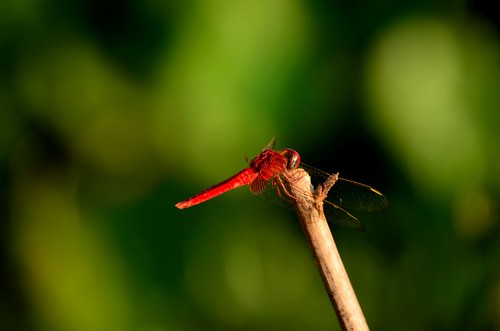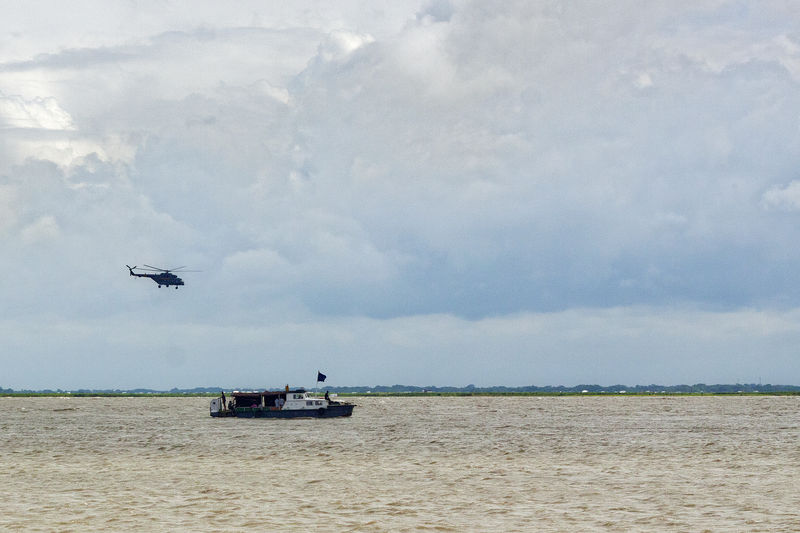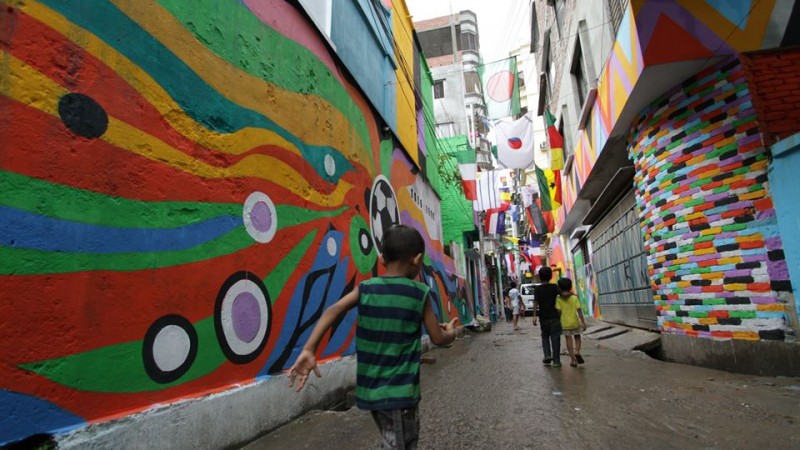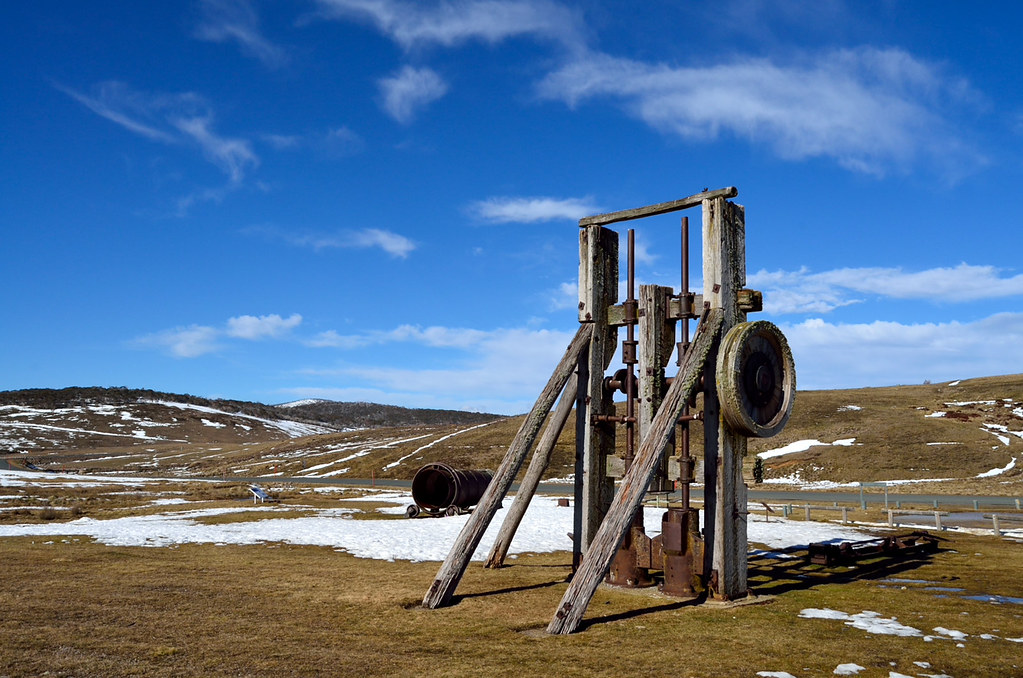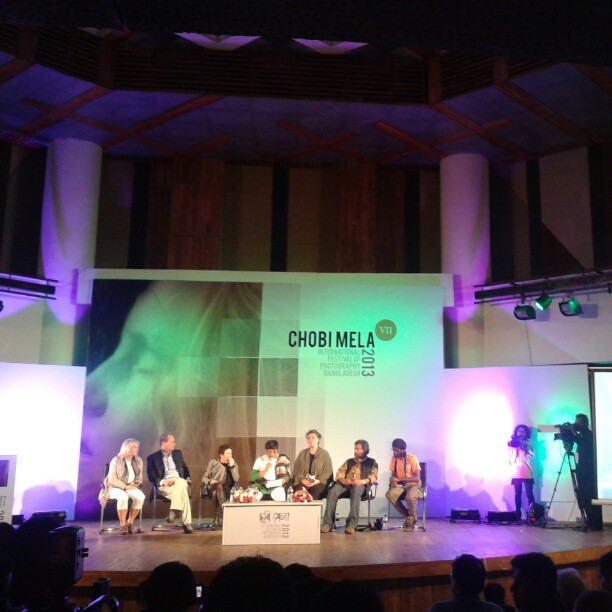Forty-two years. That's how long Bangladeshis have awaited justice for the horrific crimes committed against them during their fight for liberation from Pakistan. And on February 5, 2013, Abdul Quader Mollah, the secretary general of Bangladesh's Islamist party Jamaat-e Islami was sentenced to life in prison for murder, rape, torture and other crimes committed during the 1971 liberation war.
But tens of thousands feel that justice has not been served. They want him hanged. And they are occupying capital city Dhaka's Shahbagh intersection to show their resolve. Protests are spreading like wild fire across the country.
Jamaat-e Islami rejected Mollah's verdict and enforced a dawn-to-dusk strike on Tuesday and Wednesday disrupting life in the country. (The full verdict by the International Crimes Tribunal can be found here.)
Bloggers played a vital role in building pressure to try Mollah and other accused war criminals, many of whom are politicians with the Islamist party, and expedite a process that has been on hold for 42 years. So its no surprise that bloggers are central to organizing the ongoing protests. The Bloggers and Online Activists Network (BOAN) created a Facebook event to invite people to occupy Shahbagh square, protest against the strike and demand the death penalty for Mollah. About 70,000 people have been invited to event and more than 7000 people have confirmed they are joining.
Shahbagh, the Tahrir Sqaure of Bangladesh:
The last few days were full of protests and rallies at Shahbagh. Processions from all over the city joined the crowd of about 15,000-20,000 people, bringing the scenes of Tahrir square during 2011 Egyptian revolution to Dhaka. People are singing protest songs, reciting poems, and screening films and documentaries on Bangladesh's liberation war. Pavel Mohitul Alam updates his Facebook status from Shahbagh:
Delayed Justice:
During the 1971 liberation war an estimated 3 million people were killed by the Pakistani army and approximately 250,000 women were raped. Local political and religious militia groups like Razakar, Al Badr and Al-Shams, many of whom were also members of Jamaat-e-Islami, aided Pakistani soldiers in killing, particularly targeting Hindus. Abdul Quader Mollah, also known as 'Butcher' to the Bengalis in Mirpur area, was a senior leader of the Razakar force. He lead many mass murders in Mirpur area.
The International Crimes Tribunal was formed after 42 years of the independence to try the perpetrators of the crimes against humanity during the liberation war of Bangladesh. The first verdict of the ICT was against Abul Kalam Azad alias 'Bachchu Razakar'', who was sentenced to death for his involvement in crimes against humanity during 1971.
Outrage at the Verdict:
When Quader Mollah was sentenced to life imprisonment (peoples' anticipation was death penalty), many expressed their outrage on Facebook, Twitter and blogs. Elora Leelith demands a "Razakar and war criminal free" Bangladesh:
There were six indictments against Abdul Quader Mollah. The trial has proven his association in three of these and direct involvement in two killings. He was acquitted on one charge. The indictments are related to the following incidents:
It is not clear whether there can be an appeal against the verdict. But blogger Omi Rahman Pial pleads:
First Published in Global Voices
But tens of thousands feel that justice has not been served. They want him hanged. And they are occupying capital city Dhaka's Shahbagh intersection to show their resolve. Protests are spreading like wild fire across the country.
Jamaat-e Islami rejected Mollah's verdict and enforced a dawn-to-dusk strike on Tuesday and Wednesday disrupting life in the country. (The full verdict by the International Crimes Tribunal can be found here.)
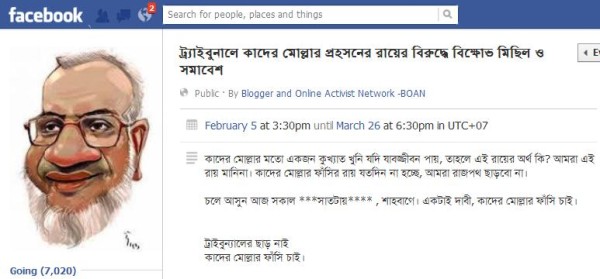 |
| Screenshot of the Facebook event that generated much response |
Bloggers played a vital role in building pressure to try Mollah and other accused war criminals, many of whom are politicians with the Islamist party, and expedite a process that has been on hold for 42 years. So its no surprise that bloggers are central to organizing the ongoing protests. The Bloggers and Online Activists Network (BOAN) created a Facebook event to invite people to occupy Shahbagh square, protest against the strike and demand the death penalty for Mollah. About 70,000 people have been invited to event and more than 7000 people have confirmed they are joining.
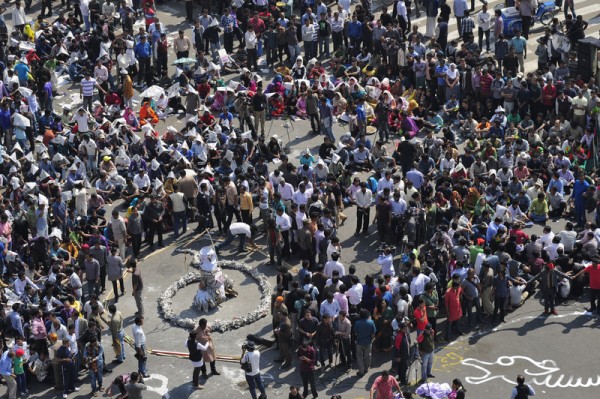 |
| People from all walks of life are continuing their sit-in at Shahbagh intersection in the capital for the second consecutive day. Image by Firoz Ahmed. Copyright Demotix (6/2/2013). |
Shahbagh, the Tahrir Sqaure of Bangladesh:
The last few days were full of protests and rallies at Shahbagh. Processions from all over the city joined the crowd of about 15,000-20,000 people, bringing the scenes of Tahrir square during 2011 Egyptian revolution to Dhaka. People are singing protest songs, reciting poems, and screening films and documentaries on Bangladesh's liberation war. Pavel Mohitul Alam updates his Facebook status from Shahbagh:
Shahbagh is full of processions, slogans and singing. Thousands of people from all walks of life are joining in protests using candle lights and are carrying torches. A band will start playing live soon. Please join us.Many have shared pictures from Shahbagh via Facebook, like ICSF and Kazi Sudipto. Journalist and writer Imtiar Shamim writes at Muktangon blog [bn]:
...This Shahbagh will soon be extended to other cities- It will beat the fear of civil war by fringe elements who envisage colonial intervention, who will clinch victory by confirming justice for the war criminals.Besides Dhaka, there has been news of similar protests in cities like Chittagong, Rajshahi, Sylhet, Khulna, Comilla, Mymensingh and Rangpur. People are gathering in large numbers raising their voices for the highest punishment for the war criminals. Rayhan Rashid writes on Facebook about spreading the protests across the country:
The fire has spread from city to city. I just want to be one of those hundreds of thousands of people....
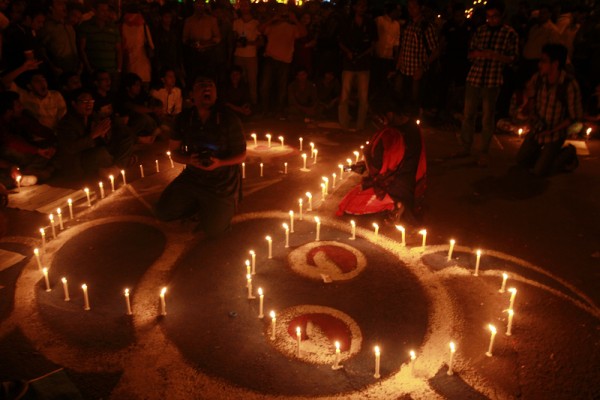 |
| Protesters on a candlelight protest organized by'Bloggers and Online Activist Network' demanding death penalty of war criminal Abdul Quader Mollah. Image by Firoz Ahmed. Copyright Demotix (6/2/2013) |
Delayed Justice:
During the 1971 liberation war an estimated 3 million people were killed by the Pakistani army and approximately 250,000 women were raped. Local political and religious militia groups like Razakar, Al Badr and Al-Shams, many of whom were also members of Jamaat-e-Islami, aided Pakistani soldiers in killing, particularly targeting Hindus. Abdul Quader Mollah, also known as 'Butcher' to the Bengalis in Mirpur area, was a senior leader of the Razakar force. He lead many mass murders in Mirpur area.
The International Crimes Tribunal was formed after 42 years of the independence to try the perpetrators of the crimes against humanity during the liberation war of Bangladesh. The first verdict of the ICT was against Abul Kalam Azad alias 'Bachchu Razakar'', who was sentenced to death for his involvement in crimes against humanity during 1971.
Outrage at the Verdict:
When Quader Mollah was sentenced to life imprisonment (peoples' anticipation was death penalty), many expressed their outrage on Facebook, Twitter and blogs. Elora Leelith demands a "Razakar and war criminal free" Bangladesh:
My first child will be born on 7 of February. I wish its generation will see a Razakar and war criminal free Bangladesh. I want capital punishment for Quader Mollah and gang.Hazrat Binoy Bhodroe asks the Tribunal on Twitter:
@hazratb9bhodroe Honorable Tribunal, how many deaths have to be proven to get a death sentence?Allegations against Abdul Quader Mollah:
There were six indictments against Abdul Quader Mollah. The trial has proven his association in three of these and direct involvement in two killings. He was acquitted on one charge. The indictments are related to the following incidents:
- April 5, 1971, on Mollah's instructions, one of his aides named Akhter killed Pallab, a student of Bangla College.
- March 27, 1971, Mollah and his aides murdered pro-liberation poet Meherun Nesa, her mother and two brothers at their home at Mirpur of Dhaka.
- March 29, 1971, Mollah, accompanied by Al-Badr, Razakars and non-Bangla speaking Bihari men, apprehended journalist Khondoker Abu Taleb and brought him to a place known as Mirpur Jallad Khana Pump House and slit his throat.
- November 25, 1971, an organised attack and indiscriminate shooting by Mollah and his cohorts killed hundreds of unarmed people of Khanbari and Ghatar Char villages in Keraniganj.
- April 24, 1971, Mollah led Pakistan army men and around 50 non-Bangla speaking Biharis into an attack on unarmed people of Alubdi village in Mirpur that left 344 people killed.
- March 26, 1971 he and his associates went the home of Hazrat Ali Laskar and killed his wife, two daughters and two year old son. One of his minor daughters was raped before she died.
It is not clear whether there can be an appeal against the verdict. But blogger Omi Rahman Pial pleads:
The appeal against the acquittal of Quader Mollah against the Keraniganj killing is the key. This protests should pressurize the government prosecution team to appeal against that acquittal. 344 people were killed and he was known as the 'butcher'. Such cruelty should beget more than just life imprisonment.According to the latest updates, the prosecution team of the ICT has taken a policy decision to appeal against the verdict to enhance Mollah's sentence. Bangladesh is one of 58 countries that still actively practices capital punishment.
First Published in Global Voices

















